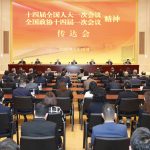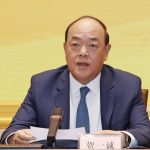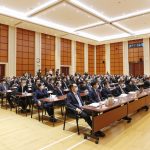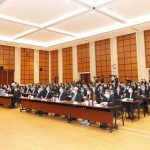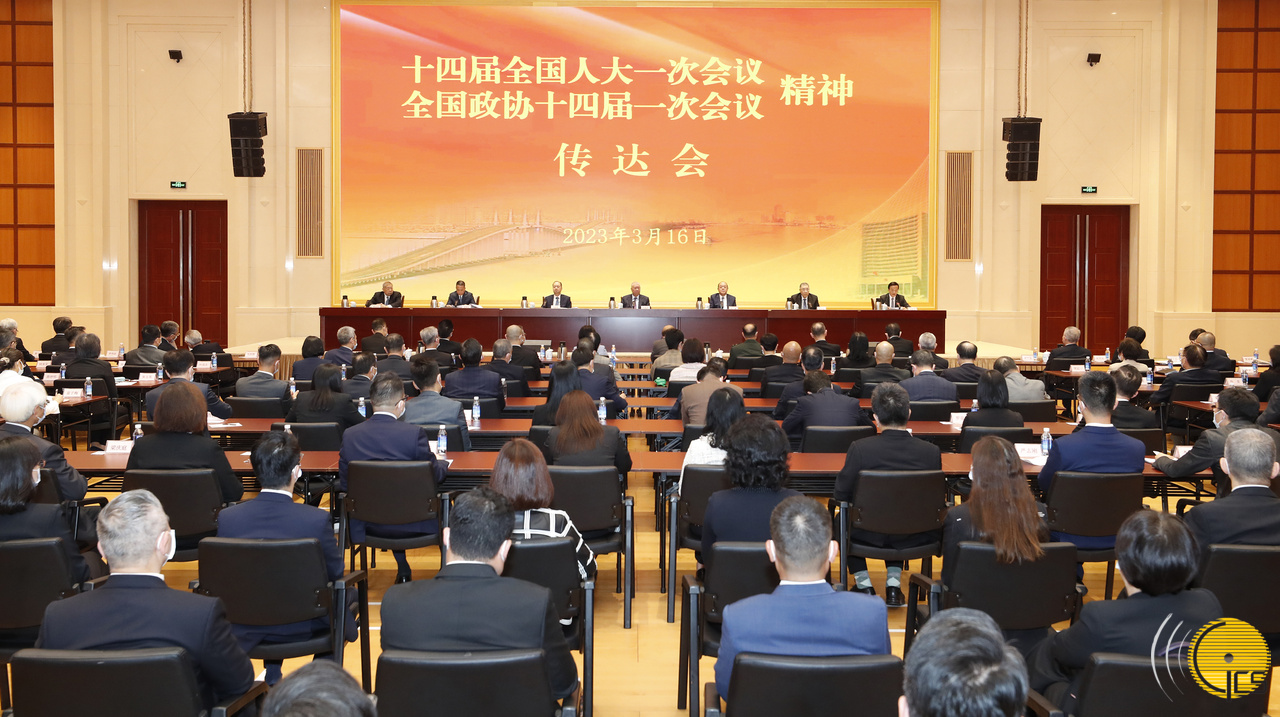 The Chief Executive, Mr Ho Iat Seng, attends a briefing session to share new policies and aspirations set out in the 2023 "Two Sessions".
The Chief Executive, Mr Ho Iat Seng, attends a briefing session to share new policies and aspirations set out in the 2023 "Two Sessions".
The Chief Executive, Mr Ho Iat Seng, called on the local community to adhere resolutely to the spirit-of-action put forward during the recently-concluded “Two Sessions” and by leaders of the Central Government.
Mr Ho made the remarks on Thursday (16 March) during a briefing in Macao to share with local officials and community members information on policies and aspirations outlined in the “Two Sessions” in Beijing, i.e., meetings of, respectively, the 14th National People's Congress (NPC) and the 14th Chinese People's Political Consultative Conference (CPPCC).
In his speech, Mr Ho noted this year’s gathering of the “Two Sessions” was of great and profound significance. As outlined in the “Two Sessions”, the Macao Special Administrative Region (MSAR) Government would steadfastly implement the “One country, two systems” principle, and consolidate the social and political conditions required for steady adherence to that principle, he stated.
In tandem, there should be further effort to accelerate Macao’s appropriate economic diversification, supported by the "1+4" development strategy and an optimisation of the structure of the local economy, said Mr Ho.
The Chief Executive underlined that work relating to people’s livelihoods would always be a top priority of the MSAR Government, along with a determination to create a better living environment for the Macao public.
During the “Two Sessions” gathering, President Xi Jinping had been re-elected unanimously as the country’s President and the Chairman of the Central Military Commission, while other leaders of the central authorities and of the CPPCC had also been selected, noted Mr Ho. Over the past five years, the country had attained remarkable achievements in various fields, including breakthroughs in the implementation of the “One country, two systems” principle, stated Mr Ho.
In the closing of the first session of the 14th NPC, President Xi had stressed that the long-term prosperity and stability of the Hong Kong SAR and the MSAR were indispensable to the building up of China as a great country. Premier Li Qiang had pledged “Three Supports” regarding Macao’s development. The state leaders’ support for Macao had thrilled and uplifted the Macao public, said Mr Ho.
During Thursday’s briefing session, Mr Ho shared with participants four points of understanding from the latest “Two Sessions”.
The first point outlined by the Chief Executive was the need fully, faithfully, and resolutely, to implement the “One country, two systems” principle, and to consolidate the social and political conditions for the steady implementation of “One country, two systems”.
The second point shared with participants by the Chief Executive was the need to step up effort for Macao’s appropriate economic diversification, and to pursue – at the earliest opportunity – normalisation of economic activity after the COVID-19 pandemic.
The Chief Executive stressed, in his third point to participants, the need for adherence to law-based governance, and the need for incessant effort to better people’s livelihoods.
The fourth point outlined by Mr Ho was the need to promote, with a spirit of enterprise, the development of the Guangdong-Macao Intensive Cooperation Zone in Hengqin, and integration of Macao into overall national development.
The Chief Executive additionally said the MSAR Government would strengthen its work with young people from a strategic perspective, supporting youth development, and helping the new generations integrate better into the overall development of the country, all with an aim of ensuring the patriotic spirit would pass on to the new generations.
Vice Chairman of the National Committee of the CPPCC, Mr Ho Hau Wah, also delivered a speech at Thursday’s briefing session. Mr Ho called on the officials employing innovations in policy-making, in order to create conditions for talented people to work in the Guangdong-Hong Kong-Macao Greater Bay Area, especially increasing motivation of young people to work in the mainland, and better assisting them to integrate into the overall developmentofthecountry.
The Vice Chairman highlighted the need to work in a pragmatic manner and one complementary to Macao’s needs and actual conditions, as part of the process of pressing ahead with appropriate economic diversification and high-quality development.
Vice Chairman Ho called on people from all walks of life in Macao to stay united and work diligently in order to make up ground relative to the three years that had passed during the COVID-19 pandemic. He also underscored the need to be in line with the Central Government’s ideas, and to support the law-based governance of the Chief Executive and the MSAR Government.
The Director of the Liaison Office of the Central People’s Government in the MSAR, Mr Zheng Xincong, also gave a speech at Thursday’s briefing session. He highlighted that the Macao community should: 1) accurately understand the “Two Sessions” spirit and unify thoughts and actions in relation to centrally-generated decisions and application of policy; 2) strengthen confidence in and determination regarding Macao's sustainable and stable development; 3) understand accurately the requirements for high-quality development, and strive to create new conditions for the implementation of the "One country, two systems” principle with Macao characteristics.
Mr Zheng urged the Macao public to promote the spirit of the “Two Sessions”, so that the public would play their due role in the development of the country and of Macao; promote the story of the successful practising in Macao of “One country, two systems”; and inspire the younger generations to develop further their patriotic spirit.


